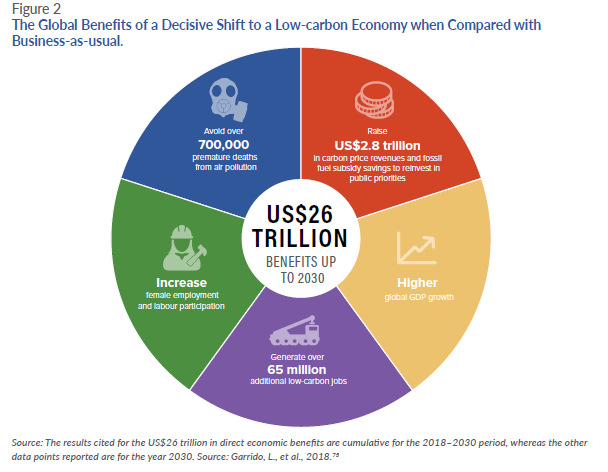Three years ago I wrote a post in my grandest style, with tony literary references and a Veronese set piece, on the negative costs of the energy transition. Remember it? I thought not. To refresh your memory, my back-of-an envelope calculation ran:
- Net cash cost of energy transition to 2040, based on IPCC: ≈ $0
- Health saving to 2040 from energy transition, using a straight-line reduction from $3.5 trn a year in 2015 to zero in 2060: ≈ $25 trillion
- Net undiscounted cost to 2040 of the energy transition (cash for energy plus health only, ignoring mitigation cobenefits): minus $25 trillion.
Now a committee of the great and the good called the Global Commission on the Economy and Climate has issued another report (website, pdf). What do you know, they have an estimate of the net costs of the transition to 2030 (pdf pages 12, 22):
Transitioning to this low-carbon, sustainable growth path could deliver a direct economic gain of US$26 trillion through to 2030 compared to business-as-usual, according to analysis for this Report.
These people are obviously more credible than me, and far more influential. The Commission is top-heavy with ex-politicians like a former president of Mexico, CEOs of big companies like Unilever, and the like. The only real expert is Lord Stern. But the actual work was done by kmowledgeable people at Brookings, the WRI, Grantham Institute, and Cambridge Econometrica (not to be confused with the FSB’s tame skunk works Cambridge Analytica). So it looks pretty solid.
How did they get their $26 trillion? Er. What you get is a Tufte-fail pie chart that makes no sense at all (see at the end), and an endnote:
70 The E3ME model of Cambridge Econometrics is a macroeconometric model with inter-linked modules on energy, economy and environment. See: https://www.camecon.com/how/e3me-model/.
So it’s a pure black box. At least my scribbled envelope was clear and sourced.
Their modellers are using a much lower estimate of pollution deaths than me (700,000 a year prevented by 2030 to my roughly twice that, taken from the OECD).
Anyway, the actual headline number is merely the central point in a very wide range of plausible scenarios and should not be taken too seriously. The strong finding is the sign (negative) and the order of magnitude (tens of trillions). You can take these to the bank.
The report has 207 pages and is full of worthy detailed stuff I did not try to address in my post. Take it as the conventional wisdom of the environmentally woke tendency of Davos Man. This is not exciting but it’s still good news.
Will it have any effect? This is a generic question about rational policy analysis in the age of Trump and Brexit. One side now knows what to do to save humanity, and the particular countries and communities it inhabits, from climate disaster. The problem is to break the opposition to doing it from entrenched fossil fuel interests and their hirelings. What we are trying to do is destroy first the coal industry, then the oil industry, finally the gas industry. They don’t like this and are fighting back. A good policy is any policy that hurts fossil fuels and can secure a decisive majority: Conan’s rules.
Footnote 1 A bad pie chart
 From page 22. This is a pie with no units, no scale, and incommensurable components. It should have been thrown to the kitchen dogs. Is there a non-empty set of wonkish and environmentally sympathetic decision-makers and opinion-formers who can’t read a chart or table?
From page 22. This is a pie with no units, no scale, and incommensurable components. It should have been thrown to the kitchen dogs. Is there a non-empty set of wonkish and environmentally sympathetic decision-makers and opinion-formers who can’t read a chart or table?
Footnote 2 A call for a thought experiment
In the USA, there seems to be a segment of conservative opinion that is in in full denial over climate change but is receptive to science over air pollution. This distinction is playing out in US courts today over the Trump attempt to roll back Obama’s CPP – for which McCarthy’s EPA wisely documented the extensive health gains. In my earlier post, I sketched an argument for the energy transition that ignored climate costs almost entirely, and focussed on the health ones. I suggest this be taken up by professionals. Does my conclusion hold up, that the transition is the right play even if we ignore the climate impacts entirely?
Doing this properly, you would need to recognise that GHG emissions and air pollution are largely complementary bads but not entirely. Cut coal and oil use, and you reduce both. But natural gas burns clean and has negligible health impacts, while adding gigatonnes of CO2. Contrariwise, the burning of wood, charcoal and dung in Third World cooking fires may be completely sustainable and zero-carbon (depending on the woodland and livestock management), but it has a very large health cost from indoor air pollution. If Cambridge Econometrica ran their model round an ambitious air-pollution-only policy that left natural gas alone while eliminating coal and oil, and addressed cookstoves, I suspect the net gain would still be in double trillion figures.
Leave a Reply
You must be logged in to post a comment.